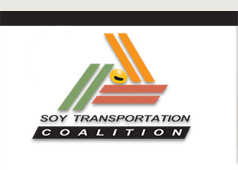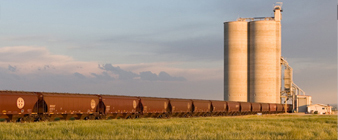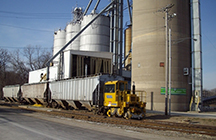 |
 |
|
| eNews • September 2013 | ||
| Promoting a Cost-Effective, Reliable and Competitive Transportation System |
||
 Railroads say they're ready for harvest
Railroads say they're ready for harvest
For many reasons –- including increased on-farm grain storage, an economy still growing slowly, and railroad capital investments of more than $12 billion annually -- finding covered hopper cars and unit trains to ship grain shouldn't be a problem this fall.
That's the consensus of the annual gathering of the National Grain Car Council, an industry group of railroads, grain shippers, and companies that make and lease railcars. The group, formed in 1994 by the predecessor of the federal Surface Transportation Board, met on September 12 in Kansas City to swap reports on the state of grain shipping.
This year BNSF is spending $4.3 billion to increase capacity and flexibility, said Frank Anderson, general director of ag operations.
"These projects do have a temporary impact" on train movement, he said.
Union Pacific is spending $3.6 billion on capital investment this year, said Bill Eilbracht, general director of logistics.
His railroad, which like the others, has increased hopper car numbers in recent years, has no service issues this fall, he said.
"We do have concerns about the Pacific Northwest," he said.
He reminded members of the grain car group that a labor dispute and lockout in Washington state continues. "We do expect it to go on for some time," he said.
Mike Steenhoek, head of the Soy Transportation Coalition organized by 11 state soybean boards, was a guest speaker at the meeting. He, too, said he's following the labor dispute. Some 68% of railcars shipping soybeans go to Oregon and Washington, he said. "That's why that issue is very concerning to us, particularly on the eve of harvest."
This year is a contrast to 2012, when grain shipments didn't follow normal patterns due to the drought. Eric Parthemore, CEO of Heritage Cooperative, a central Ohio co-op owned by 5,0000 farmers, said that instead of 120-bushel corn yields last year, Heritage members would harvest 170 to 175 bushels.
"After last year, I'm really looking forward to talking to our railroads and complaining about service problems," he joked.
Parthemore said he doesn't expect farmers to be aggressively selling corn at prices that are much lower than a year ago. Part of the reason is the recent expansion of on-farm storage.
"We've got a lot of space out there for the crop to come into," he said.
Ed Sims, general manager of a Kenton, Tennessee, terminal owned by The Andersons, said growers in the South are harvesting a bumper crop of corn, and they have less storage than in some other regions.
"Hats off to you folks that have extra cars. The South needs them," he said.
Although rail capacity and the number of grain hopper cars have improved from a decade ago, Steenhoek said his group of soybean growers is concerned that over the long-term, railroads may not be investing enough to keep up with projected increases in agricultural production.
The cost of production for raising soybeans in the U.S. and in competing nations like Brazil isn't dramatically different, he said. Where the U.S. has a competitive advantage is in its transportation infrastructure and its inland waterway system located in the heart of agricultural production.
"Sometimes outcompeting the rest of the world is not about innovations, it's about delivery," he said.
Brad Hildebrand, assistant vice president of Cargill AgHorizons, who chaired the meeting, told the group that grain producers in Ukraine are now competing with the U.S. in the Far East.
"The world is going to be a much more competitive place," he said. That's good for humanity, he added, "but it also means for us in the United Sates and the industry, we've got to be at the top of our game."
Source: Successful Farming
Soy Transportation Coalition |
|
